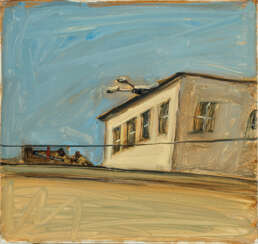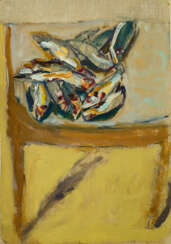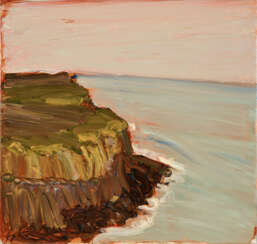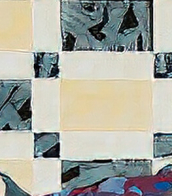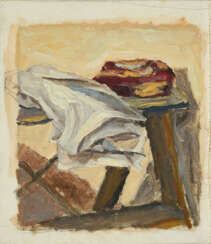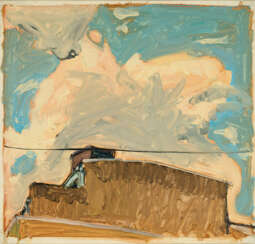peter schmersal (1952)

Peter Schmersal is a German painter who lives and works in his native city and in Berlin. His work is characterized by a stylistic variety. Schmersal studied graphic design in Wuppertal from 1971 to 1975 and then worked as a graphic designer. From 1978 he engaged in painting. In the mid-1980s, primarily still lifes, landscapes and architectural depictions were created. There is already a certain casualness to the motifs from this period, they appear in fleeting snapshots that are characterized by a fragmentary execution. The still lifes show classic subjects: flowers, fruits, dead animals and everyday objects such as bottles, serviettes, stools or tables. At the beginning of the 1990s, in addition to urban landscapes, there were above all examinations of the portrait, which is also often fragmented, not only from the front, but often also in an unusual top or bottom view, up to a physiognomic detail representation, for example the mouth and mouth eye area. Since the beginning of the millennium, the choice of motifs at Schmersal could hardly have been more heterogeneous. Due to the well-considered incoherence of individual motifs, Schmersal juxtaposes the most diverse types of authorship, style, genre and context of exploitation. In terms of motifs, there are still no self-imposed specific guidelines, but figures, still lifes and landscapes continue to dominate
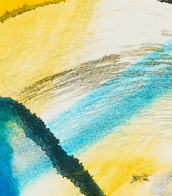

Peter Schmersal is a German painter who lives and works in his native city and in Berlin. His work is characterized by a stylistic variety. Schmersal studied graphic design in Wuppertal from 1971 to 1975 and then worked as a graphic designer. From 1978 he engaged in painting. In the mid-1980s, primarily still lifes, landscapes and architectural depictions were created. There is already a certain casualness to the motifs from this period, they appear in fleeting snapshots that are characterized by a fragmentary execution. The still lifes show classic subjects: flowers, fruits, dead animals and everyday objects such as bottles, serviettes, stools or tables. At the beginning of the 1990s, in addition to urban landscapes, there were above all examinations of the portrait, which is also often fragmented, not only from the front, but often also in an unusual top or bottom view, up to a physiognomic detail representation, for example the mouth and mouth eye area. Since the beginning of the millennium, the choice of motifs at Schmersal could hardly have been more heterogeneous. Due to the well-considered incoherence of individual motifs, Schmersal juxtaposes the most diverse types of authorship, style, genre and context of exploitation. In terms of motifs, there are still no self-imposed specific guidelines, but figures, still lifes and landscapes continue to dominate
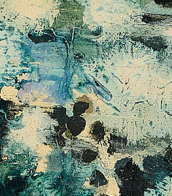

Peter Schmersal is a German painter who lives and works in his native city and in Berlin. His work is characterized by a stylistic variety. Schmersal studied graphic design in Wuppertal from 1971 to 1975 and then worked as a graphic designer. From 1978 he engaged in painting. In the mid-1980s, primarily still lifes, landscapes and architectural depictions were created. There is already a certain casualness to the motifs from this period, they appear in fleeting snapshots that are characterized by a fragmentary execution. The still lifes show classic subjects: flowers, fruits, dead animals and everyday objects such as bottles, serviettes, stools or tables. At the beginning of the 1990s, in addition to urban landscapes, there were above all examinations of the portrait, which is also often fragmented, not only from the front, but often also in an unusual top or bottom view, up to a physiognomic detail representation, for example the mouth and mouth eye area. Since the beginning of the millennium, the choice of motifs at Schmersal could hardly have been more heterogeneous. Due to the well-considered incoherence of individual motifs, Schmersal juxtaposes the most diverse types of authorship, style, genre and context of exploitation. In terms of motifs, there are still no self-imposed specific guidelines, but figures, still lifes and landscapes continue to dominate


Peter Schmersal is a German painter who lives and works in his native city and in Berlin. His work is characterized by a stylistic variety. Schmersal studied graphic design in Wuppertal from 1971 to 1975 and then worked as a graphic designer. From 1978 he engaged in painting. In the mid-1980s, primarily still lifes, landscapes and architectural depictions were created. There is already a certain casualness to the motifs from this period, they appear in fleeting snapshots that are characterized by a fragmentary execution. The still lifes show classic subjects: flowers, fruits, dead animals and everyday objects such as bottles, serviettes, stools or tables. At the beginning of the 1990s, in addition to urban landscapes, there were above all examinations of the portrait, which is also often fragmented, not only from the front, but often also in an unusual top or bottom view, up to a physiognomic detail representation, for example the mouth and mouth eye area. Since the beginning of the millennium, the choice of motifs at Schmersal could hardly have been more heterogeneous. Due to the well-considered incoherence of individual motifs, Schmersal juxtaposes the most diverse types of authorship, style, genre and context of exploitation. In terms of motifs, there are still no self-imposed specific guidelines, but figures, still lifes and landscapes continue to dominate
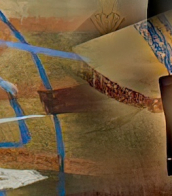

Peter Schmersal is a German painter who lives and works in his native city and in Berlin. His work is characterized by a stylistic variety. Schmersal studied graphic design in Wuppertal from 1971 to 1975 and then worked as a graphic designer. From 1978 he engaged in painting. In the mid-1980s, primarily still lifes, landscapes and architectural depictions were created. There is already a certain casualness to the motifs from this period, they appear in fleeting snapshots that are characterized by a fragmentary execution. The still lifes show classic subjects: flowers, fruits, dead animals and everyday objects such as bottles, serviettes, stools or tables. At the beginning of the 1990s, in addition to urban landscapes, there were above all examinations of the portrait, which is also often fragmented, not only from the front, but often also in an unusual top or bottom view, up to a physiognomic detail representation, for example the mouth and mouth eye area. Since the beginning of the millennium, the choice of motifs at Schmersal could hardly have been more heterogeneous. Due to the well-considered incoherence of individual motifs, Schmersal juxtaposes the most diverse types of authorship, style, genre and context of exploitation. In terms of motifs, there are still no self-imposed specific guidelines, but figures, still lifes and landscapes continue to dominate

